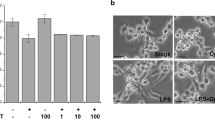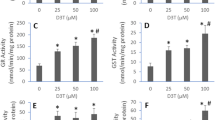Abstract
The effect of 5-fluorouracil (5-FU) on the production of nitric oxide (NO) in macrophages was examined by using lipopolysaccharide (LPS)-stimulated RAW 264.7 cells. 5-FU at non-toxic concentrations significantly inhibited NO production in LPS-stimulated RAW 264.7 cells. The inhibition by 5-FU was mediated by attenuated expression of an inducible NO synthase protein and mRNA. 5-FU inhibited the activation of nuclear factor (NF)-κB and the subsequent nuclear translocation. Furthermore, 5-FU inhibited the phosphorylation of Akt, an upstream molecule of NF-κB signaling. 5-FU did not affect a series of mitogen-activated protein kinases. Therefore, 5-FU was suggested to inhibit the LPS-induced NO production in activated macrophages through preventing Akt-dependent NF-κB activation.







Similar content being viewed by others
References
Albina JE, Reichner JS (1998) Role of nitric oxide in mediation of macrophage cytotoxicity and apoptosis. Cancer Metastasis Rev 17:39–53
Lechner M, Lirk P, Rieder J (2005) Inducible nitric oxide synthase (iNOS) in tumor biology: the two sides of the same coin. Semin Cancer Biol 15:277–289
Xu W, Liu LZ, Loizidou M, Ahmed M, Charles IG (2002) The role of nitric oxide in cancer. Cell Res 12:311–320
Malet-Martino M, Jolimaitre P, Martino R (2002) The prodrugs of 5-fluorouracil. Curr Med Chem Anti-Cancer Agents 2:267–310
JinY, Heck DE, DeGeorge G, Tian Y, Laskin JD (1996) 5-Fluorouracil suppresses nitric oxide biosynthesis in colon carcinoma cells. Cancer Res 56:1978–1982
Jung ID, Yang SY, Park CG, Lee KB, Kim JS, Lee SY, Han JW, Lee HW, Lee HY (2002) 5-Fluorouracil inhibits nitric oxide production through the inactivation of IkappaB kinase in stomach cancer cells. Biochem Pharmacol 64:1439–1445
Oshima T, Imada T, Nagashima Y, Cho H, Shiozawa M, Rino Y, Takanashi Y (2001) Role of nitric oxide in human gastric cancer cells treated with 5-fluorouracil. Oncol Rep 8:847–849
Jiang J, Liu J, Zhu J, Yang C, Zhang A (2002) Mechanism of apoptotic effects induced by 5-fluorouracil on human liver carcinoma Bel7402 cell line. Chin Med J 115:968–971
Xie QW, Whisnant R, Nathan C (1993) Promoter of the mouse gene encoding calcium-independent nitric oxide synthase confers inducibility by interferon gamma and bacterial lipopolysaccharide. J Exp Med 177:1779–1784
Liu S, Adcock IM, Old RW, Barnes PJ, Evans TW (1993) Lipopolysaccharide treatment in vivo induces widespread tissue expression of inducible nitric oxide synthase mRNA. Biochem Biophys Res Commun 196:1208–1213
Hanelt M, Gareis M, Kollarczik B (1994) Cytotoxicity of mycotoxins evaluated by the MTT-cell culture assay. Mycopathologia 128:167–174
Green LC, Wagner DDA, Glowgowski J, Skepper PL, Wishnok JS, Tannenbaum SR (1982) Analysis of nitrate, nitrite and 15N nitrate in biological fluids. Anal Biochem 1236:131–138
Islam S, Hassan F, Mu MM, Ito H, Koide N, Mori I, Yoshida T, Yokochi T (2004) Piceatannol prevents lipopolysaccharide (LPS)-induced nitric oxide (NO) production and nuclear factor (NF)-kappaB activation by inhibiting IkappaB kinase (IKK). Microbiol Immunol 48:729–736
Romashkova JA, Makarov SS (1999) NF-kappaB is a target of AKT in anti-apoptotic PDGF signaling. Nature 401:86–90
DeFranco AL, Hambleton J, McMahon M, Weinstein SL (1995) Examination of the role of MAP kinase in the response of macrophages to lipopolysaccharide. Prog Clin Biol Res 392:407–420
Guha M, Mackman N (2001) LPS induction of gene expression in human monocytes. Cell Signal 13:85–94
Lala PK, Orucevic A (1998) Role of nitric oxide in tumor progression: lessons from experimental tumors. Cancer Metastasis Rev 17:91–106
Ekmekcioglu S, Tang CH, Grimm EA (2005) NO news is not necessarily good news in cancer. Curr Cancer Drug Targets 5:103–115
Azuma M, Yamashita T, Aota K, Tamatani T, Sato M (2001) 5-Fluorouracil suppression of NF-KappaB is mediated by the inhibition of IKappab kinase activity in human salivary gland cancer cells. Biochem Biophys Res Commun 282:292–296
Fresno Vara JA, Casado E, De Castro J, Cejas P, Belda-Iniesta C, Gonzalez-Baron M (2004) PI3K/Akt signalling pathway and cancer. Cancer Treat Rev 30:193–204
Nicholson KM, Anderson NG (2002) The protein kinase B/Akt signalling pathway in human malignancy. Cell Signal 14:381–395
Kim D, Dan HC, Park S, Yang L, Liu Q, Kaneko S, Ning J, He L, Yang H, Sun M, Nicosia SV, Cheng JQ (2005) AKT/PKB signaling mechanisms in cancer and chemoresistance. Front Biosci 10:975–987
Cheng JQ, Lindsley CW, Cheng GZ, Yang H, Nicosia SV (2005) The Akt/PKB pathway: molecular target for cancer drug discovery. Oncogene 24:7482–7492
Baldwin AS Jr (1996) NF-kappa B and I kappa B proteins: new discoveries and insights. Annu Rev Immunol 14:649–683
Muller JM, Ziegler-Heitbrock HW, Baeuerle PA (1993) Nuclear factor kappa B, a mediator of lipopolysaccharide effects. Immunobiology 187:233–256
Kawai T, Takeuchi O, Fujita T, Inoue J, Muhlradt PF, Sato S, Hoshino K, Akira S (2001) Lipopolysaccharide stimulates the MyD88-independent pathway and results in activation of IFN-regulatory factor 3 and the expression of a subset of lipopolysaccharide-inducible genes. J Immunol 167:5887–5894
Toshchakov V, Jones BW, Perera PY, Thomas K, Cody MJ, Zhang S, Williams BR, Major J, Hamilton TA, Fenton MJ, Vogel SN (2002) TLR4, but not TLR2, mediates IFN-beta-induced STAT1alpha/beta-dependent gene expression in macrophages. Nat Immunol 3:392–398
Weinstein SL, Finn AJ, Dave SH, Meng F, Lowell CA, Sanghera JS, DeFranco AL (2000) Phosphatidylinositol 3-kinase and mTOR mediate lipopolysaccharide-stimulated nitric oxide production in macrophages via interferon-beta. J Leukoc Biol 67:405–414
Acknowledgments
This work was supported in part by a Grant-in-Aid for Scientific Research (KAKENHI 14570247). We are grateful to K. Takahashi and A. Morikawa for the technical assistance.
Author information
Authors and Affiliations
Corresponding author
Rights and permissions
About this article
Cite this article
Islam, S., Hassan, F., Tumurkhuu, G. et al. 5-Fluorouracil prevents lipopolysaccharide-induced nitric oxide production in RAW 264.7 macrophage cells by inhibiting Akt-dependent nuclear factor-κB activation. Cancer Chemother Pharmacol 59, 227–233 (2007). https://doi.org/10.1007/s00280-006-0261-2
Received:
Accepted:
Published:
Issue Date:
DOI: https://doi.org/10.1007/s00280-006-0261-2




